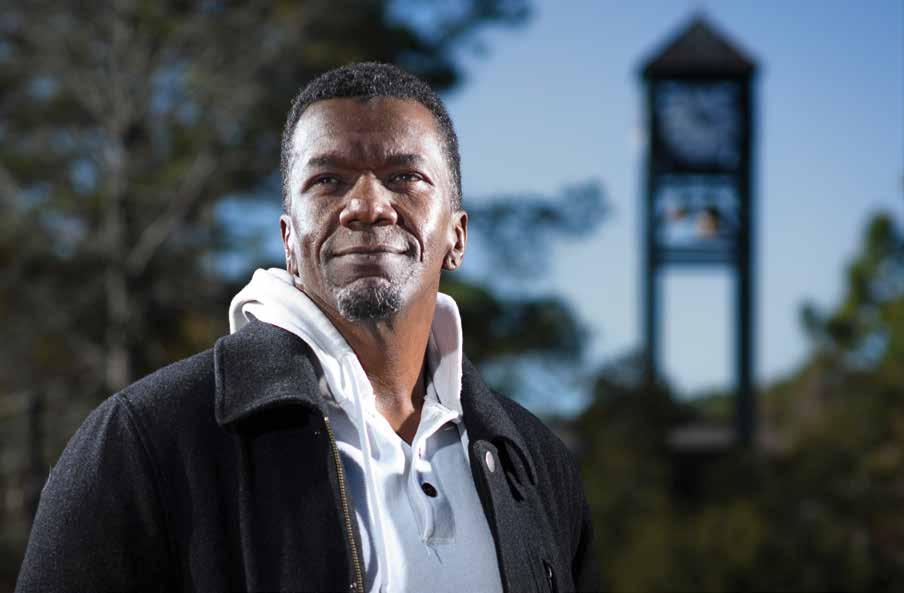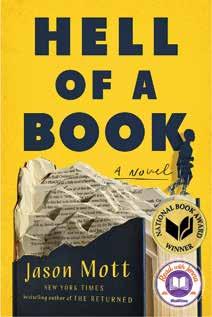
4 minute read
UP CLOSE WITH JASON MOTT
By Venita Jenkins
Jason Mott ’06, ’08M describes his latest novel, Hell of a Book, as the Rocky Balboa of all his books. Every time he thought the novel was “down for the count, it would come back swinging.”
Advertisement
When Mott first pitched the project, he said no one would support a story about a Black author on a cross-country book tour. He continued to work on the book, drawing from recent headlines and his personal experiences to create a story that addresses race and racism. The novel he thought would never be published became, of all things, the 2021 National Book Award winner.
The Altogether Factual, Wholly Bona Fide Story of a Big Dreams, Hard Luck American-Made Mad Kid.
What inspired the idea for Hell of a Book?
It started back in 2013 when I was on the book tour for The Returned. When I finished the tour, I told my agent that I wanted to write a story about an author on a book tour. She wasn’t a big fan of the idea. I wrote about half of a manuscript then put it away. Every few years, I would bring it up, and it was shot down by my agent and editor.
Around the time of the death of Freddie Gray and the Baltimore riots (2015), I had a friend living in Baltimore, and we talked about Freddie Gray and being Black in America. I had a lot of thoughts I needed to put down, and my friend said I should write something about it. I started writing my thoughts on being Black, little anecdotes from my childhood, certain points of my life, things that have happened. Eventually, I had about half a book of my thoughts. I combined the two manuscripts and sent it to my agent. She loved it.
How did you come up with the title for your book?
Funny little trivia fact, I have never titled a single novel I wrote. Every novel has been titled by either my agent or my editor because I’m really bad at titles.
What do you want readers to take away from reading Hell of a Book?
The book delves into so many different things. At its core, it’s about the admission and acknowledgment that the experiences of minorities and people of color in America are inherently different than they are for white Americans. That is something that needs to be discussed and worked toward to solve.
Do you feel like you took a risk writing this book?
This is the riskiest book I’ve ever written. I left my publisher to write this book, which was terrifying. We had creative differences and different goals for my fourth novel. I knew I wanted to write something very different from what I had been writing, and I knew my publisher wanted me to keep writing the kind of things I had been writing. We were at an impasse.
It was kind of the book nobody wanted, and I was banking my life on it. Even after the book came out, it did okay, but it didn’t do as phenomenally as everyone had hoped. This is the kind of book I’ve wanted to write for a long time. So that alone was worth the risk. Which of the characters do you relate to the most and why?

As a writer, every character has some part of you within them, but this novel is very much semi-autobiographical. There are lots of my personal experiences in this book. I feel more vulnerable and more exposed. What do the words “literary success” mean to you?
Literary success is simply saying anything you want to say the way you want to say it. It’s never about sales, and it’s never about awards or any of those things. The National Book Award was never a goal of mine. My goal is to learn something from every project, do something better the next time around and continue growing as a writer. I’m not going to pretend it’s not awesome to get that recognition and that kind of validation. That should never be your goal because it becomes a trap. You’re trying to write towards what you think people want you to say instead of what you want to say.
Hell of a Book Accolades
• Longlisted for the 2022 Carnegie Medal for Fiction • 2021 National Book Award for Fiction • 2021 Sir Walter Raleigh Award for Fiction • 2021 Joyce Carol Oates Prize • 2021 Aspen Words Literary Prize
Of your books, which is your favorite?
The Returned is always going to be special. It took me from answering phones at Verizon Wireless to being a full-time author. This novel is my favorite for all of the other reasons, not just the accolades, but the fact that it allowed me to write in a voice that I’ve wanted to write in for so long. When I was in grad school at UNCW, I did a thesis about superheroes and the death of my father. That will always hold a very special place for me because it was a personal project.
What advice would you give aspiring writers?
Be kind to yourself. Writers are always very critical of themselves. They limit their growth because they set impossible expectations. The thing about writing that I’ve learned is writing is a long process. As young writers, we often don’t give ourselves the time to learn and grow. I could not have written this 10 years ago. I could not have written this 20 years ago. It took me until now to have the skill set, the experience and knowledge to get to the point where I could write this book.









